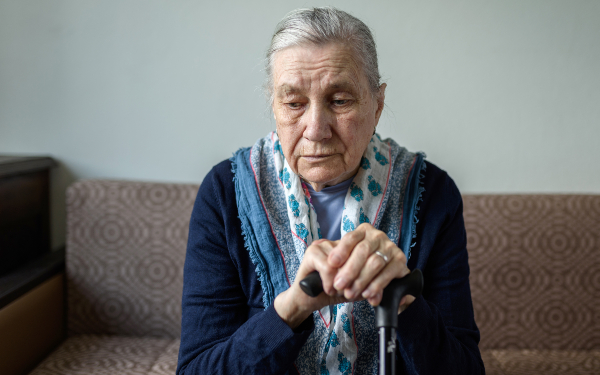
Inequalities in access to adult social care are deepening due to the cost of living crisis, staff shortages and squeezed council budgets.
That was the message today from the Care Quality Commission in its annual State of health care and adult social care report.
The regulator said council funding for care was not keeping up with need, with requests for care per 100,000 population up 4.9% from 2017-18 to 2021-22, while the numbers receiving care as a result fell by 2.2%.
It found that a quarter of providers surveyed in July 2023 had considered quitting the sector over the past year, as council funding failed to keep pace with their rising food, energy and staffing costs.
Reduced service capacity
Workforce shortages had resulted in reduced service capacity. The number of registered care home beds shrank by 0.6% in the year to July 2023, and home care providers deemed hard to replace delivered almost 15% fewer hours’ care in the first three months of 2023 compared to the same period in 2021.
Care home profitability was at historic lows, and with council-funded care being less profitable than the private market, the CQC found a greater proportion of fees had come from private sources in the past year.
This risked leaving people in deprived areas, who are more dependent on state services, going without care, it warned.
Specialist services for people with learning disabilities and autistic people, including supported living, saw a sharp fall in their profit margins from 2021-23, driven by rising staff costs.
However, with a much smaller private market, they were less able to subsidise state-funded provision through self-funder fees, meaning that it was “vital” for them to receive increased funding.
People going without care due to cost of living
At the same time, the CQC found that some self-funders were going without some of the home care they needed because of the cost of living crisis and increased provider fees.
Staffing shortages resulted in providers deprioritising less urgent visits, sending one carer for calls that required two, overloading staff rotas, giving workers overlapping calls and leaving too little travel time between visits.
And despite the number of vacancies across social care falling in 2022-23, mainly due to international recruitment, 54% of providers surveyed reported recruitment difficulties and 31% retention challenges.
While the CQC welcomed Skills for Care’s decision to develop a sector-led social care workforce strategy, the regulator said it was vital that the government produced its own staffing plan.
“The work that Skills for Care do will be positive, but it will need to have an outcome which is why we are calling for a national workforce strategy,” said James Bullion, the regulator’s chief inspector of adult social care and integrated care. “The sector alone cannot solve those problems.”
State of social care ‘unremittingly grim’
Charity coalition the Care and Support Alliance said the 2022-23 State of care report was “without doubt the worst we have ever seen and within it, the picture painted of how social care is currently performing is unremittingly grim”.
The CSA’s chairs, Caroline Abrahams (Age UK), Emily Holzhausen (Carers UK) and Jackie O’Sullivan (Mencap), added: “In particular, the growing inequality in people’s ability to access social care, and the vanishingly small options for those with little money, living in poor areas, is a source of huge concern to us.”
For the Association of Directors of Adult Social Services, president Beverley Tarka said: “Funding is not keeping up with people’s needs, so fewer can access care and people who can’t afford to pay for care themselves are more likely to be going without the support they need.
“And it’s left care staff overworked, stressed, and poorly paid, meaning many leave their jobs and we have difficulty recruiting people to replace them.”
People in deprived areas ‘unable to access care they need’
Nuffield Trust senior policy analyst Sally Gainsbury said: “Local authorities were already struggling to meet growing need for care services before rising cost pressures hit, so inevitably this means more people unable to access care they need, particularly in more deprived areas.
“Financial pressures as well as repeated failed reforms have left social care services fragile and seen council-funded care packages shrinking with increasing numbers of people shut out from publicly funded care.”
The situation prompted widespread calls for the government to not only find more money for the sector in next month’s autumn statement but also provide long-term investment in social care.
Call for more money
“Immediate investment is needed in the autumn statement to end the gridlock, address unmet and under-met need and ensure timely access to social care for all who need it, not just those who are able to afford it,” said the Local Government Association (LGA)’s community wellbeing board chair, David Fothergill.
“Local authorities need a good funding settlement this autumn to avoid further cuts to care, and a government commitment to a fully funded social care workforce strategy is long overdue,” added the CSA’s chairs.
Provider representative body Care England’s chief executive, Martin Green, said: “Social care must be seen as an essential part of national infrastructure. The social care sector is brimming with talent and provides essential support for our citizens.
“We need a government that understands the importance of social care and sets about creating an environment where it flourishes, rather than struggles.”
DHSC defends record on investment
A Department of Health and Social Care spokesperson defended the government’s record, saying the sector had access to an additional £8.1bn from 2023-25 “to put the adult social care system on a stronger footing including buying more care packages, helping people leave hospital on time and boosting the workforce”.
This comprises:
- £3.2bn extra through the existing social care grant, though this is for both adults’ and children’s services, with an expected 40% due to be spent on the latter.
- £1.6bn to tackle delayed discharges, with the funding split between councils and NHS integrated care boards.
- £1.6bn through increasing the adult social care council tax precept by 2% and raising standard council tax by 3% in each year.
- £1.08bn through the market sustainability and improvement fund, designed to help councils increase provider fees, tackle waiting lists and boost recruitment and retention.
- £570m through a separate market sustainability and improvement fund – workforce fund, which has the same objectives but is particularly focused on tackling staff shortages.
However, Gainsbury, for the Nuffield Trust, added: “Continued short-term funding injections into social care are fuelling uncertainty and leaving the sector susceptible to shocks, unable to invest in the workforce and infrastructure needed for the future.”





 Family help: one local authority’s experience of the model
Family help: one local authority’s experience of the model  ‘I spent the first three months listening’: how supportive leadership can transform children’s services
‘I spent the first three months listening’: how supportive leadership can transform children’s services  How senior leaders in one authority maintain a culture of excellence
How senior leaders in one authority maintain a culture of excellence  How staff support ensures fantastic outcomes for children and families
How staff support ensures fantastic outcomes for children and families  Workforce Insights – showcasing a selection of the sector’s top recruiters
Workforce Insights – showcasing a selection of the sector’s top recruiters 

 Facebook
Facebook X
X LinkedIn
LinkedIn Instagram
Instagram
Isn’t it about time they raised the self-funding threshold? It’s been the same since I qualified nearly twenty years ago. Basically, no one is eligible! The people not receiving care are the usual offenders. Those who have saved, bought a house etc. My serious advice, when you retire, sell up, give away as much as you want, spend the rest and move into a £100,000 sheltered housing flat.
Social care has been the poor relation IMHO since the early ’80s . It has not yet reached the ‘sainted’ profile of the NHS in the UK public opinion reflected in the poor pay and working conditions of care staff, the low opinion of qualified SWs,or the appalling treatment of unpaid carers. So sadly not a vote catcher or a subject of interest to the public until they need it – and so it continues. I have worked all hours in care, managed care and am a QSW and can say with all honesty that people who work in the care sector are ( in the vast majority) there as a vocation, and that is hugely taken advantage of. Now I am disabled and old and looking down the gun barrel of needing that care will it be there ? I leave that thought there with little confidence.
I so agree Jacqui I am a former family carer and in 1984 joined my wife’s single-parent family of 2 daughters the elder had multiple physical disabilities, a sensory disability and severe learning disabilities and was much later found to be autistic. Before my meeting, the younger daughter helped her mother look after her just elder sister, so there was some element of Younger carer involvement. With my involvement, the younger daughter could to some extent have her own life back. But I found out much later after the death of my wife in September 2020 that there was a little resentment with my younger daughter toward her mother due to the lack of attention she was receiving during the time before I joined the family. However, she never expressed such to her mother as she appreciated it was no fault of her mother and her elder sister, just how it was.
My wife and I continued to manage the care between us, my wife already giving up paid work to be a full-time family carer claiming the very insufficient Carers Allowance, but supplemented by my own income. The health of my wife and my own was then fairly good, but my wife’s health started to deteriorate and I was still working full-time, so in 2008 we applied for some home care and were granted 6 hours per day from Monday to Friday, which I extended to 6.5 hours by including an unpaid half-hour lunch break. A few years later my wife’s health had continued to deteriorate and my own started to so we applied for more care and got similar for Saturdays and Sundays. Over the next few years, both our health continued to deteriorate and I reduced my 5 working days to 3 days, but after some years it became clear that more home care was required and in 2015 we asked for more and to our surprise was offered 24/7 care.
With the initial 6 hours of home care through Monday to Friday we were granted a Direct Payment which I managed myself and not through a Managed Account. But with the Saturday, Sunday and the eventual 24/7 care minus the 6.5 hours Monday to Friday the Direct Payment was extended to include payments to a care provider. After one poor care provider, we found another that was excellent and so were the carers they provided. After the death of my wife and previously taking early retirement for health reasons, I eventually decided in 2021 that I could no longer manage the Direct Payment and the employment of the 2 carers Monday to Friday so the 2 carers were Tuped into the care provider and after much discussions the Care provider did take over management of the Direct Payment.
But as I said I am a former family carer as my daughter eventually succumbed to her disabilities and she died in October 2022.
All this time I extended my involvement in adult social care by offering my experience to the local authority and to this day I am extensively involved in many working groups endeavouring to improve the systems, but also I am involved with my Local Healthwatch, a number of disability charities and whenever possible the health authorities and university research.
So I have extensive experience on the shortages of funding for social care generally, including insufficient funding for social workers as well as paid family carers. While social workers are so overworked and paid insufficiently, this is similar to that of paid carers in all aspects of care, especially within home care, where many are only on the National Living Wage, currently £10.42. let alone the Real Living Wage of £10.90 per hour or perhaps slightly more, but still way insufficient and the resulting so shortages of carers, even with the little influx of non-UK care workers who have to be sponsored to the degree of £10,000 I believe by their care provider and their work visas are nowhere long enough.
Social care has been on its knees for years and those knees are so well wornout now, that the existence of social care in any real form is really not possible, which will have great implications for the NHS for one can’t exist without the other.
So, this so-called great funding of £8 billion is ‘chicken feed’ to what is really required and to have it shared between children’s and adult social care is so ridiculous, for Adult social care needs at least £8 billion itself and children also. But even £8 billion is nowhere sufficient and it should be £12 billion just for adult social care and not just for this year but many subsequent years and increasing in line with real inflation. To not do so will see the decline of social care not gradularily but significantly until there is no real social care for anyone and that is not far off and really surprised it hasn’t already.
One of the reasons is the significant contribution of family carers which in 2021 was over £193 billion and more than likely increasing and if not not decreasing. Family carers are human also and in providing care their own health deteriorates as I know from my own family and the sad death of my wife in September 2020 and maybe mine sooner than later.
So the health of both persons in need of care and their families will continue decline requiring much more social care and then resulting in much more NHS care and so the insufficiencies continue to escalate, just because government won’t sufficiently fund social care let alone the NHS. We can’t all afford private health like many in the government can and that is also why there are staff deficiencies in the NHS as they go to the private sector or away from the UK completely for ever.
This government and most before have been incapable of looking after social care and I so fear so will future governments.